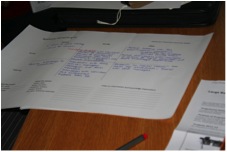The impending release of the UK Government’s Knowledge & Information Strategy has shone a spotlight on the need for all areas of government to capture, effectively manage and share the knowledge and information they create and receive…if they are to deliver a world class and publically accountable digital public service.
I wonder how many UK taxpayers associate HMRC with being at the leading edge of government practice? Yet a few months back 14 senior business people gathered for the first modules ran by Victoria Ward and I of a Civil Service Learning pilot programme* entitled capturing and exploiting corporate knowledge.
The venue was Whitehall, London yet the delegates came from around the country and represented a wide variety of disciplines from across HMRC: VAT Directorate; Anti Money Laundering; Large Businesses Service; Corporation Tax, International and Anti-Avoidance (CTIAA); Specialist Investigations; Local Business Comliance: and Excise, Customs, Stamps & Money Services (ECSM).
in advance
We asked the delegates to:
…bring along an object. An image, document or small artifact that illustrates a memorable event with which you were involved during your last couple of years in the business. It might be a decision, a new piece of policy or a transaction. We are going to ask you to talk about the object and use it during the exercises so please think carefully about what you might choose.
Here’s why: Objects stimulate conversations; people feel comfortable talking about them in environments where otherwise they might not open up. They reveal insights other techniques fail to unearth and so are effective as icebreakers and as triggers for more in-depth discussions on events and projects.
One of the core beliefs I’ve developed working with Sparknow is that, to be effective and valued, knowledge management has to be about helping to improve the decision making capacity of individuals, teams and organisations. Indeed it features in the opening sentence of the World Bank’s definition of KM:
…Knowledge provides insight for decision making…
So, much of early stage investigation into critical knowledge has to be around events and decisions and how knowledge has (or has not) informed them. Objects have proved to be a good way of facilitating those early dialogues and feature prominently in the work we do.
By combining timelines and objects to examine an event or decision in an Anecdote Circle we imagined this would act as a real stimulus in helping to place clarity around the concept of critical knowledge.
module one: Positioning
aims
- understand the importance of critical knowledge to HMRC
objectives
- able to identify critical knowledge
- see how and why others identify and capture critical knowledge
Reassuringly people were prepared and had an object, an image or something in mind (this is often not the case). Here’s an extract from Victoria’s fieldnotes taken during the plenary debrief on the memorable objects session:
My object wasn’t that helpful, it was just a document…But it was a conversation starter, very simple very plain, a trigger… It brought a story to life and helped with focus
The Anecdote Circle helped the delegates identify the event or decision they wished to examine in more detail.
For that we invited them to use a tool, (worksheet) for conducting a more in depth (Deep Dive) type of discussion, Sparknow has christened the Narrative Grid.
Comments were broadly favourable and the Narrative Grid was to feature later in the programme by which time they were more attuned to its benefit and skilled in its application.
From looking at critical knowledge from an internal perspective we shifted to the external environment drawing on examples from the nuclear industry, the health industry and the regulatory industry to illustrate how they had set about identifying what critical knowledge was in their business and why they set about capturing it. A common theme running through each example, with which the HMRC delegates were able to empathise, was the need to mitigate risk especially around the departure of staff with considerable expertise and experience.
There was broad agreement that critical knowledge:
‘It’s the knowledge HMRC would struggle without if it lost’
And in working through examples the delegates were able to identify two compelling metaphors: bomb defusing and cake making
- In defusing bombs the precise critical knowledge is knowing what wire to cut.
- For recipes, it’s not just the recipe, ingredients, marinading, but how hot is my oven?
Module One ended with us providing the delegates with a set of references and reading. We also provided a link to an interview I’d conducted with Gordon Vala-Webb a promiment KM’er in Canada who was in charge of a project to capture and retain knowledge for a regulator at a time when many of its most experienced staff were about to retire and would impact them operationally. Gordon gives an eloquent explanation of how a large govenrment organisation tackled this and determined the knowledge they could least afford to lose. Here are a few snippets:
…we took a risk management approach and got each of the branches to fill in a risk assessment form as part of the annual business planning process… a high score would have resulted in the branch developing a risk mitigation plan… we provided guidance on different approaches which included videoing, interviewing, expanding procedure manuals…in some cases they kept the retiring staff on call…
…I believe if we had not had this program people would have been scrambling to keep operating…
More to follow on Modules 2 through 6 over the next few weeks.
*Sparknow and Knowledge et al worked in partnership to deliver this programme.



Hi Paul and Victoria,
Thanks for the insightful article describing the importance of generating actions around critical knowledge. Too many organisations are either completely unaware of the risk or just paying lip service to this. A lack of action in this area already causes significantly lower performance in organisations that they realise – through slower “time to productivity” of new employees (due to retarded knowledge sharing and transfer), poorer decisions (excuses like “we couldn’t have known”- when actually they could have), poor succession management (inefficient handovers and lost knowledge causing repeat of same errors in future)… we could go on forever. These hidden costs can be removed or at least reduced with better critical knowledge processes.
It is also great to see action learning methods and reflective conversation being used as tools to enable the interactions (two of my favourite ways to build capability and convert potential into value). Now we just hope that your workshop participants genuinely “hear” the potential and risks and act to mitigate them. There should be no excuse for lack of action once the awareness is there – but this has traditionally been another human failing. As Gothe stated around two hundred years ago:
“Knowling is not enough, we must do.
Willing is not enough we must act.”
Hi Arthur great points – the article on the front page of The Times today could have been written by you:
Snip
Ministers spent up to £800 million parachuting in consultants and temporary staff last year, despite giving big payoffs to tens of thousands of civil servants.
Departments are laying off workers but taking on expensive consultants — often earning more than £1,000 a day — to do the same jobs in a “revolving door” at the heart of the Civil Service. …
end of Snip
The article talks to the need for more effective planning (in effect better knowledge transfer).
And finally, as I will reveal in future postings a number of the participants took learnings back into the business and have already noticed a change – one reason why the Evaluation Team were happy to award a 3 on the Kirkpatrick scale.
Agreed Paul,
The biggest issue we face in government and corporate is a disease called “unsustainable initiativitis”, the condition where everyone can only see as far as the next “budget and bonus” cycle (typically one year). Big incentives exist, including the ego pleasing “hero status” for making savings within the cycle- regardless of the long term effects (usually quite detrimental). Climate change is just one larger picture impact of this and deforestation of the Amazon and other parts of the world are others. Enron is another example showing you can’t simply put off the impacts of short term poor decision making forever. The game played by the self-proclaimed “leaders” (quite an oxymoron in reality as genuine leaders take us towards a sustainable desired better future state) is to get in, get the bonuses and get out before they brunt of the impacts are blamed on you (and ensure the next guy it hit hard by them as this reinforces that you are good and they are not in the same class as they can’t keep it going- knowing all along that it could never work).
I wish we had some more genuine leaders and that people would think beyond tomorrow, as everyone would be better off (except those “leaders” taking advantage of the mass ignorance of what they are raping – instead of reaping)